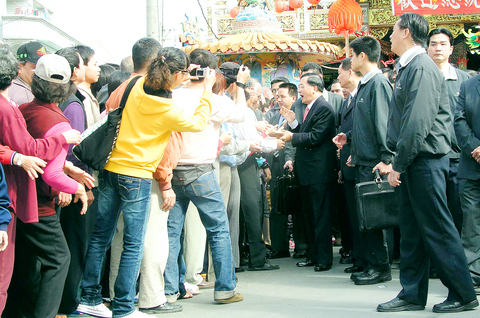Now is an appropriate time to seriously consider abolishing the National Unification Council and the Guidelines for National Unification in order to reflect the current state of Taiwanese consciousness, President Chen Shui-bian (陳水扁) said yesterday.
"What Chinese unification are we after?" Chen asked, describing the guidelines as "a store whose sign has disappeared and stocks gone."
"In addition to considering whether to abrogate the nominal Unification Council and guidelines, I'd like to see the nation join the United Nations with the name of Taiwan," Chen said.

PHOTO: CHANG CHUNG-YI, TAIPEI TIMES
"In addition, I'd like to see the draft of a new constitution completed by the end of the year so it can be put to a popular vote next year," he said.
Chen listed his three goals for the new year in the opening speech at a lunch banquet held by hundreds of his supporters at his alma mater of Matou Junior High School in Matou (麻豆) Township, Tainan County.
Chinese Nationalist Party (KMT) Chairman Ma Ying-jeou (馬英九) responded to Chen's comments by saying that the president had promised before his election and re-election that he would not abolish the council.
If the president now decided to abolish the council, his credibility would be questioned, Ma said.
The council was set up in 1991 by then-president Lee Teng-hui (
The guidelines set a goal to pursue a unified China that is governed by a democratic and free system with equitable distribution of wealth.
The guidelines also outline what positive steps both sides can take in the near, medium and long-term to ultimately achieve the goal of unification.
Chen also vowed to continue reform and urged the people to defend the nation's democracy and sovereignty.
"Most Taiwanese people hope to see the country pursue national dignity and enhance Taiwanese consciousness," he said.
"Both the Presidential Office and the new Cabinet will exert themselves to accomplish the goal in the new year," he said.
Meanwhile, a brawl outside president's family home in Chichuang (
Blows were exchanged as a dispute over who was first in line became heated.
Chen Chao-shou (陳朝壽) of Taipei County was the first person to receive the red envelope from Chen yesterday. He said that he had camped outside the president's home since arriving to stand in line about a week ago.
Hou Tai-an (
Hou and Chen Chao-shou got into a shoving match, which was stopped by national security officers. Hou later managed to punch Chen Chao-shou in the face after both received their red envelopes.
About 18,000 people had lined up to receive the red envelopes, which contained a NT$10 coin. They also received a CD entitled the Songs of Taiwan.
Chen Shui-bian and his wife, Wu Shu-chen (
The presidential tradition was begun by former president Lee Teng-hui (
Many stake out a spot in line days ahead of time by placing a stool or a chair in their place.
The amount of money in the envelopes was reduced from NT$200 to NT$10 in 2004 because of an anti-vote-buying law that limits gifts given by candidates to voters to no more than NT$30.

AGING: As of last month, people aged 65 or older accounted for 20.06 percent of the total population and the number of couples who got married fell by 18,685 from 2024 Taiwan has surpassed South Korea as the country least willing to have children, with an annual crude birthrate of 4.62 per 1,000 people, Ministry of the Interior data showed yesterday. The nation was previously ranked the second-lowest country in terms of total fertility rate, or the average number of children a woman has in her lifetime. However, South Korea’s fertility rate began to recover from 2023, with total fertility rate rising from 0.72 and estimated to reach 0.82 to 0.85 by last year, and the crude birthrate projected at 6.7 per 1,000 people. Japan’s crude birthrate was projected to fall below six,

Conflict with Taiwan could leave China with “massive economic disruption, catastrophic military losses, significant social unrest, and devastating sanctions,” a US think tank said in a report released on Monday. The German Marshall Fund released a report titled If China Attacks Taiwan: The Consequences for China of “Minor Conflict” and “Major War” Scenarios. The report details the “massive” economic, military, social and international costs to China in the event of a minor conflict or major war with Taiwan, estimating that the Chinese People’s Liberation Army (PLA) could sustain losses of more than half of its active-duty ground forces, including 100,000 troops. Understanding Chinese

US President Donald Trump in an interview with the New York Times published on Thursday said that “it’s up to” Chinese President Xi Jinping (習近平) what China does on Taiwan, but that he would be “very unhappy” with a change in the “status quo.” “He [Xi] considers it to be a part of China, and that’s up to him what he’s going to be doing, but I’ve expressed to him that I would be very unhappy if he did that, and I don’t think he’ll do that. I hope he doesn’t do that,” Trump said. Trump made the comments in the context

SELF-DEFENSE: Tokyo has accelerated its spending goal and its defense minister said the nation needs to discuss whether it should develop nuclear-powered submarines China is ramping up objections to what it sees as Japan’s desire to acquire nuclear weapons, despite Tokyo’s longstanding renunciation of such arms, deepening another fissure in the two neighbors’ increasingly tense ties. In what appears to be a concerted effort, China’s foreign and defense ministries issued statements on Thursday condemning alleged remilitarism efforts by Tokyo. The remarks came as two of the country’s top think tanks jointly issued a 29-page report framing actions by “right-wing forces” in Japan as posing a “serious threat” to world peace. While that report did not define “right-wing forces,” the Chinese Ministry of Foreign Affairs was